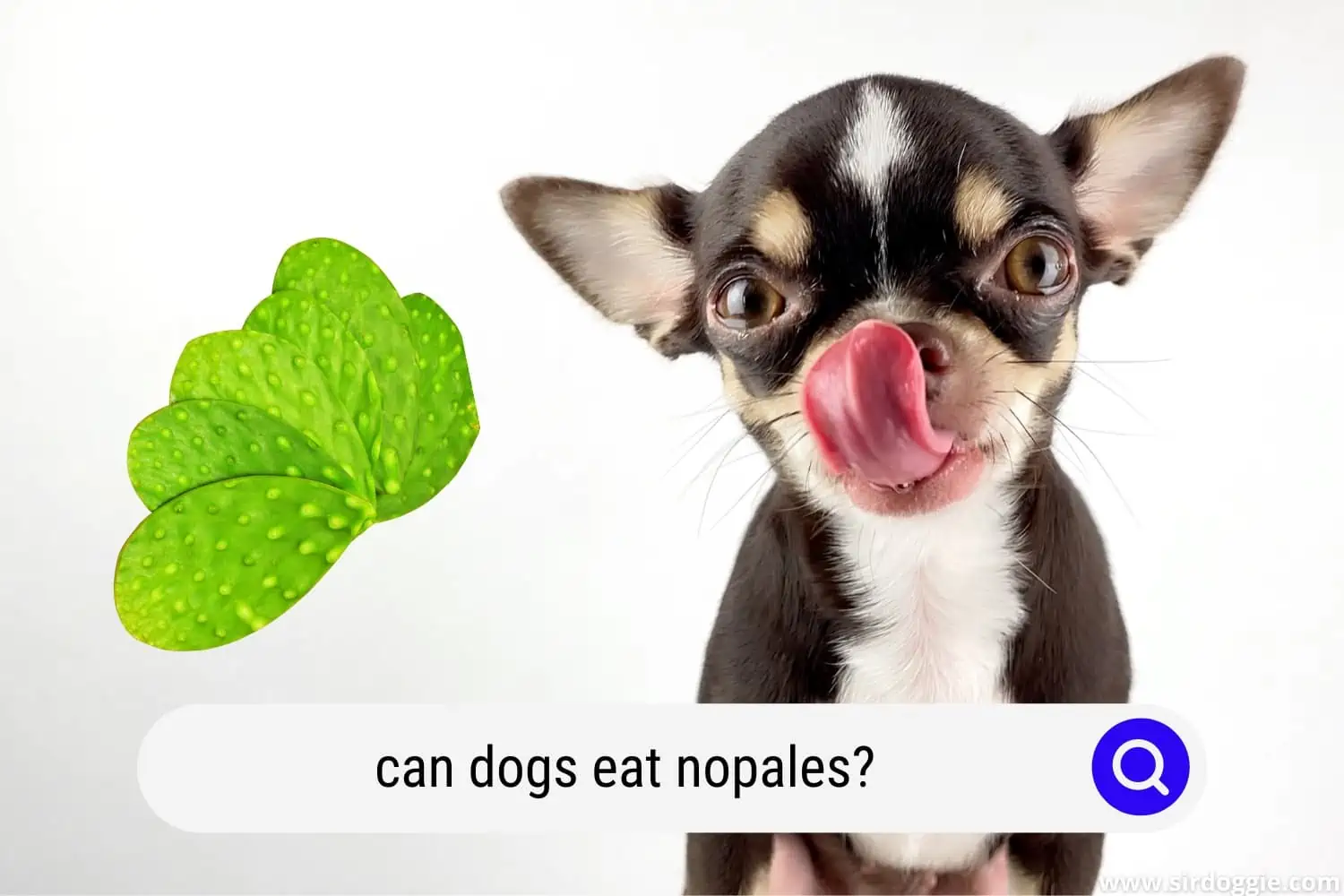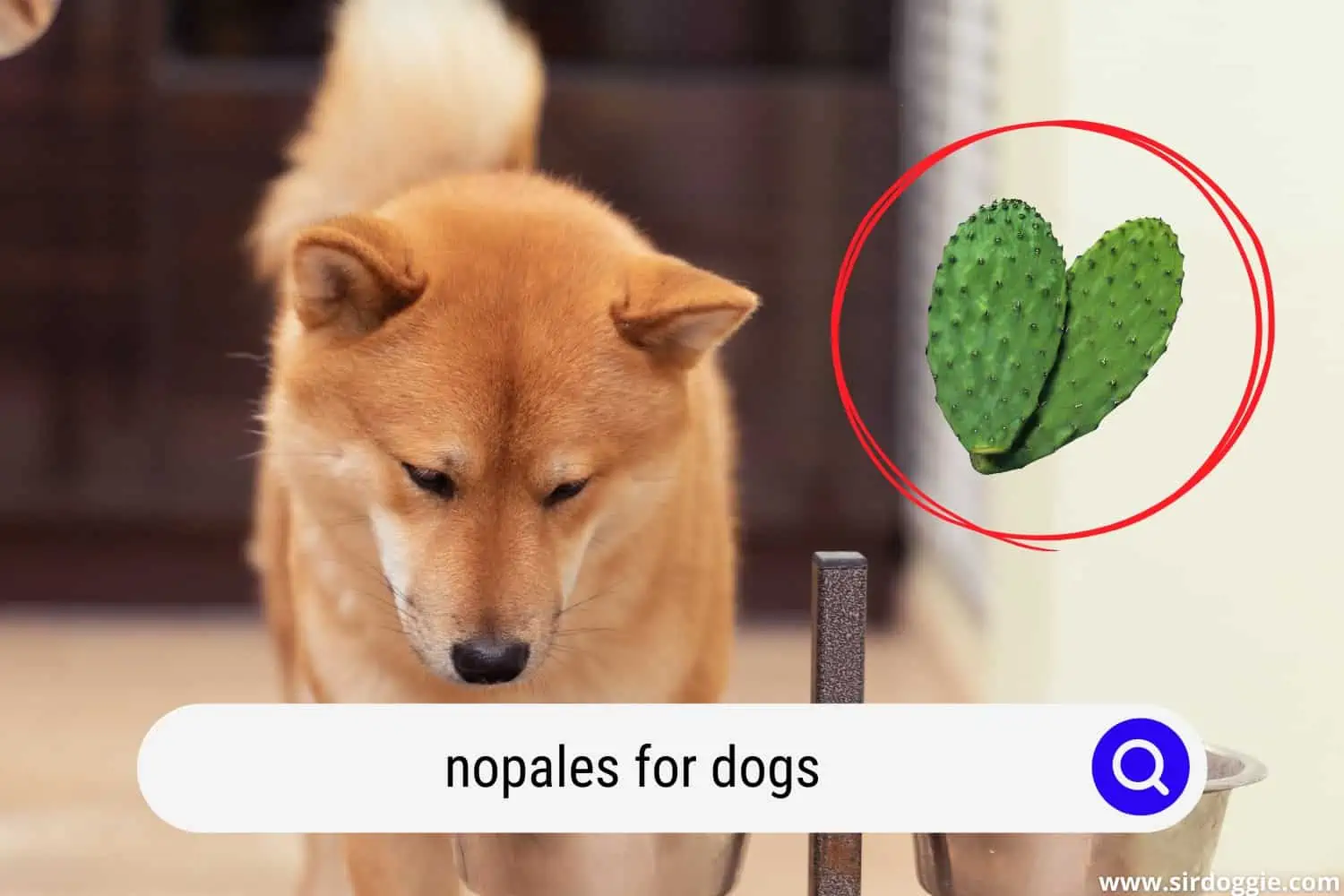Can Dogs Eat Nopales? Read This Frist!
If you enjoy having plenty of plants around your house, including exotic plants like nopales (also known as prickly pear cactuses), you may be concerned with the possibility of health issues related to if canines mistakenly or willingly consume these plants. Nopales might attract your dog since they have a strong smell, but can dogs eat nopales? Is it safe for them?
Generally, nopales are not safe for dogs, and they can be even more dangerous if consumed in large quantities. This is because they contain oxalates that are not good for canines’ health. A large amount of nopal consumption can cause numerous issues for your dog, including vomiting, stomach distress, diarrhea, inflammation, and other notably dangerous consequences. Therefore, it is not recommended to ever give nopales to your dogs.

Are Nopales Harmful to Dogs?
Yes, nopales are harmful to canines. Because of the oxalates and calcium oxalate crystals that are abundant in nopales, allowing your dog to eat any can be incredibly detrimental to its health. Moreover, when they’re raw, they are even more deadly since the cooking process at least slightly destroys some of the risks associated with the cacti’s oxalate content.
Some of the main causes of concern with a dog consuming nopales include the following:
- Raw nopales have a high concentration of oxalates, which is not good for a dog’s health. Therefore, nopales should not be given to dogs. Because of the high amount of oxalic acid concentration in the plant, if the dog rubs against it, it can cause severe damage to both the mouth and the skin. In circumstances related to the consumption of excessive amounts of nopales, the levels of oxalic acid can be harmful to your dog’s kidneys as well.
- Cooking deactivates the majority of the harmful oxalates; therefore, the oxalate poisoning risk is mostly only a problem when nopales are in their raw form. However, since there is always the possibility of some of these non-dog-friendly components persisting past the cooking process, it’s best to proceed with caution and not allow your dog to eat cooked nopales either.
- If thorns are not removed before offering nopales (whether raw or cooked), these can cause severe lacerations in the dog’s mouth or gastrointestinal tract. This can lead to bleeding and serious health issues and will need to be addressed by a veterinarian immediately.
- If your dog does consume nopales, your canine must be carefully monitored to ensure that it does not have any negative reactions or side effects such as temperature issues, appetite changes, or excessive sleepiness. Any changes that indicate poisoning or a severe adverse reaction should be reported to your dog’s veterinarian as soon as possible.
Related Reading: Can Dogs Eat Chocolate Pudding?
What Exactly Are Nopales?
A nopal is a plant that belongs to the cactus family and is native to Mexico. These plants are members of the genus Opuntia and are most commonly referred to as “prickly pear cacti” in the United States and other countries.
These plants are regularly eaten in Mexican cuisine, where they may be found in soups, sandwiches, marmalades, stews, and many other dishes. They can be eaten raw or cooked, according to a person’s personal preferences. In addition to being used for culinary purposes, these plants are also used for medicinal purposes.
Are Nopales Safe for Dogs?
No, it is not safe for canines to eat this plant because nopales can cause blockages in the gut or esophagus that may lead to bloat or impaction, which is a life-threatening condition. As mentioned above, they also include the risk of internal lacerations and significantly negative digestive side effects.
Some of the other symptoms associated with nopal consumption include severe stomach aches as well as unconsciousness, weakness, and convulsions.
Nopales poisoning may also manifest itself in the form of vomiting, diarrhea, and tiredness. It is also very possible that your dog’s gastrointestinal tract has been injured by the oxalate crystals commonly found in this form of cactus if blood is found in his or her feces. If you find blood in your pet’s feces, you should consult your veterinarian immediately.
It is recommended that you not allow dogs to roam freely in areas where they may come into contact with nopales due to these numerous risk factors. If you have a large yard, put your dog on a leash whenever it goes outside to prevent exposure to these plants if they are also present in the area. It is entirely possible to prevent the risk of harmful issues by nopales if your dog is kept completely away from the plant in general.
Tip: For your dog to grow strong and healthy, you should feed him a well-balanced, well-prepared meal appropriate for his age and size, and avoid unusual foods such as these exotic plants.
Is It Possible for Nopales to Kill Dogs?
Yes. Nopales are entirely capable of killing dogs. Consuming this plant in significant quantities can result in renal failure, and the intake of the fruit of the prickly pear cactus is particularly hazardous. When it comes to harming your pet, whether the nopales are eaten cooked or raw or with or without the spikes removed, there is no difference between the preparation methods or lack thereof. If your dog consumes nopales, you should seek medical attention immediately.
What Should You Do If Your Dog Eats Nopales or Comes Into Contact With This Plant?
Keeping nopales and other cactus plants out of your dog’s reach is essential if you want to keep them from being ingested by your dog. Maintaining the distance between your dog and these plants will eliminate any concerns about your canine’s mischievous nature or any interest he or she may develop in the plant.
If your dog comes into contact with nopales at home, pay close attention to his or her behavior, and contact your veterinarian immediately if anything appears to be amiss. Any indicators of poisoning or an adverse reaction—such as unusual salivation, loose stools, nausea, vomiting, or any other odd behavior—should be closely monitored.
If your dog did not consume nopales but did come into direct contact with them, inspect your canine’s coat and skin carefully to see if there are any thorns present. If there are, remove them immediately. You can easily and quickly remove any thorns from your dog’s body right at home without any complications.
If you find thorns in your dog’s skin or stuck in his or her coat, do not leave your pooch alone as they may attempt to pull them out on their own, resulting in much more serious problems due to further damage.

FAQs
As a substitute for nopales, what can you give to your dog?
If your dog is sensitive to cooked nopales (which are still risky even in prepared form) or you simply want to give him or her a treat instead of a nopal that they may be interested in, there are a variety of safe and healthful human foods that can be used as fantastic pet treats if your pup is insistent on eating “people food.” These dog-friendly treat options include pumpkins, peaches, and bananas, among other fruits and vegetables.
Can dogs consume nopales that have been cooked?
Although it still comes with risks, canines can eat nopales that have been cooked thoroughly after the removal of thorns. The best course of action is to avoid allowing your pet to consume nopales at all. However, if your pet does need to consume this plant for some reason, boil the nopal pads well before giving them to your dog. Oxalates are easily dissolved in water during cooking, and most of them will be washed away throughout the preparation process.
However, there is still debate regarding whether cooking the cactus makes it guaranteed to be safe enough for dogs to consume or not. With this being the case, it’s advised not to take any chances and just completely avoid giving your dog this plant in general.
Is nopal juice safe for dogs to consume?
Primarily, most nopal juice is made from fresh nopal pads. Due to the oxalate content present in these, this will yet again result in health risks for your dogs. Cactus juice and even cactus smoothies may be very healthy beverage options for humans, but due to how different our metabolisms and dietary needs are from our canine companions, this does not mean such a juice is also safe for our pups.
Related Reading: Can Dogs Eat French Toast?

Family Dog Expert Author
Hi there! I’m Stuart, a devoted dog lover and family dog expert with over a decade of experience working with our furry companions. My passion for dogs drives me to share my knowledge and expertise, helping families build strong, loving bonds with their four-legged friends. When I’m not writing for SirDoggie, you’ll find me hiking, playing with my beautiful dog, or studying music.